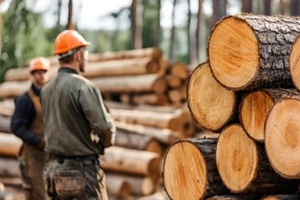
The logging industry contributes to Virginia’s economy, supplying essential materials for construction, paper production, and more. Yet the risks are severe, ranging from heavy equipment accidents to falls, and environmental issues. Full logging insurance is imperative for any business in the logging industry. The right policy can protect business operations without overextending the budget.
The following actionable steps can help logging businesses save on insurance without compromising the quality of their coverage.
Why Invest in Logging Insurance?
Logging insurance addresses the specific perils associated with businesses operating in one of the most high-risk industries. Without proper coverage, a single lawsuit, accident, or equipment failure could lead to serious consequences.
Here are some essential areas of coverage for logging businesses to consider:
- Workers’ Compensation Insurance: Virginia law requires businesses with more than two employees to carry workers’ compensation insurance. This coverage secures medical care and wage replacement for employees who are injured on the job.
- Commercial Auto Insurance: Virginia law also requires businesses that own and operate vehicles for logging operations to carry commercial auto insurance to cover accidents and liability risks.
- General Liability Insurance: While the law does not require logging businesses to carry general liability insurance, it strongly recommends this coverage to protect against third-party claims for injuries or property damage, which can result in costly lawsuits.
- Equipment Insurance: This covers damage or loss to logging machinery. Again, Virginia does not legally require logging companies to carry equipment insurance, but going without it can be a major financial risk.
Understanding these policies allows loggers to make smart, cost-saving adjustments while avoiding unexpected coverage gaps. With the help of experienced insurance agents, logging businesses can find coverage that meets insurance requirements without overspending.
Smart Ways to Lower Logging Insurance Costs
Lowering logging insurance costs does not mean sacrificing coverage. Strategic adjustments enable businesses to save money while maintaining comprehensive coverage. Here are some practical ways businesses can make excellent policies more affordable.
1. Strengthen Safety Measures
Insurance companies evaluate a business’s safety record when setting premiums. Fewer accidents and claims result in lower rates. Despite the inherent dangers of logging, there are ways to mitigate these risks, including the following:
- Regular Safety Training: Employees should know how to operate equipment and respond to emergencies.
- Routine Equipment Maintenance: Scheduled maintenance prevents breakdowns and accidents.
- Safety Protocols: Operating procedures and protective gear should meet or exceed industry standards.
A well-executed and carefully documented safety program with clear policies and regular inspections proves to insurers that a business takes risk management seriously, which can lower premiums.
2. Bundle Policies for Better Rates

Insurance companies often provide discounts for bundling multiple policies, which can lead to meaningful savings. Combining general liability, commercial auto, and equipment coverage under one provider can save money and close coverage gaps.
3. Keep a Clean Claims History
Filing fewer claims signals to insurers that a business is low-risk. To avoid unnecessary claims, logging businesses should:
- Address minor issues before they become major problems.
- Train employees to follow safety procedures.
- Set up an internal reporting system for potential hazards.
Even a single claim can increase premiums. Taking proactive measures to mitigate risks will ultimately result in fewer claims and lower insurance costs
4. Review Your Policy Annually
As a business grows, its insurance needs evolve. Therefore, businesses should review their insurance policies annually to adjust the coverage to fit their current situation. For example, if a business has upgraded equipment or changed locations, it may need to update its policy to reflect those changes and avoid paying for coverage it no longer needs.
5. Invest in Employee Certification
Well-trained employees are less likely to cause accidents. Some insurance providers offer discounts to businesses that require workers to complete certification programs. Investing in training not only improves safety but can also lower insurance costs.
How an Experienced Insurance Agent Can Help
While saving on logging insurance is important, insufficient coverage can expose a business to catastrophic financial losses in the event of a major accident. An agent who understands the risks and challenges intrinsic to logging businesses can customize coverages to fit clients’ needs. This industry savvy can result in cost-effective solutions that don’t compromise coverage.
Contact Burton & Company to Protect Your Logging Business Without Overspending

Logging businesses in Virginia need comprehensive insurance coverage, but that does not mean you have to pay more than necessary. By improving safety, bundling policies, keeping a clean claims history, and regularly reviewing your coverage, you can lower insurance costs while staying fully protected.
Burton & Company helps logging businesses lower insurance costs by assessing their specific risks and creating a cost-effective insurance plan customized to their needs. Contact us today to request a quote. Let our experienced team help you secure the best logging insurance coverage at the right price.

